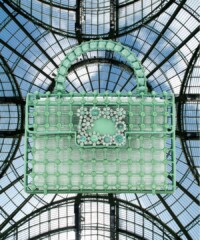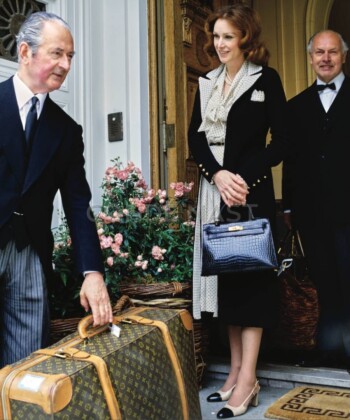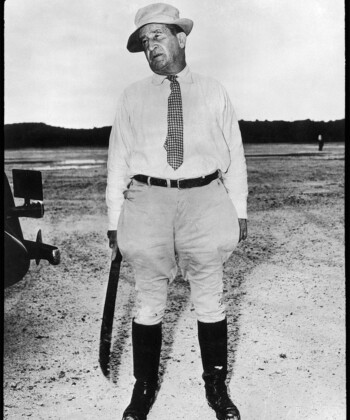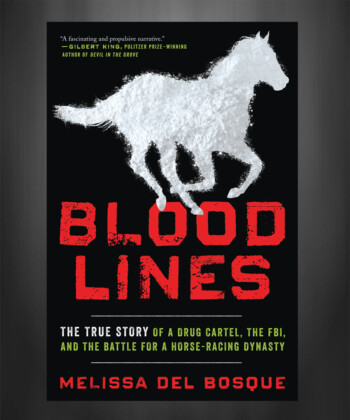Because Richards was the group’s golden goose, some felt he was given special privileges, “like flying around the world fucking beautiful models,” says Picinich. Yet while they lived off his money, the group felt that Richards’ work was inherently evil. “The fact that the world puts so much importance on someone who won a genetic lottery—to the point of putting a billboard in Times Square and paying that person hundreds of thousands of dollars—is the exact reason why the world needs to be destroyed,” Richards says in an attempt to explain the cult’s point of view.
He tried to downplay his secret life with the people he met as a model while making choices those colleagues didn’t understand. “Everyone else was living it up. It was like, ‘Hey, let’s go to Madonna’s for the weekend!’ ” Richards has said. “But I was like, ‘No, no. I can’t. The end of the world is coming.’ ”

As it was with his mother, it was with the cult. Nothing he did was good enough, but Richards kept trying. “More than anything, I felt like I’d made a commitment and I couldn’t give up,” he says. “Freddy had told us that we were responsible for our own lives—which I could deal with—but we were also responsible for the millions of people we were supposed to help, and that was a heavy trip that I couldn’t screw up.”
The hold Eternal Values had on him became so strong that he stayed on even after von Mierers’ death in 1990 from AIDS-related causes. According to Richards, the Manhattan district attorney’s office was investigating von Mierers’ gemstone scams at the time of his death, but discontinued after he died, when it was discovered that the self-proclaimed alien’s real name was Freddie Miers. He’d been raised Jewish in Brooklyn.
After Freddy died, there was a power struggle within Eternal Values. Freddy’s successors were even more extreme. As the years passed and the group relocated to a big house on Lake Lure, North Carolina, Richards continued to earn money and fame but the group became increasingly hateful toward him. He was often interrogated for hours on end about what they called his “ego lapses.”
“He was a good guy and a bit of a people pleaser,” Picinich recalls. “After Freddy’s death, the [new] leader was pretty cruel to him. You could see the toll it took.” Richards recalls some truly terrible behavior: “They said I was resistant and resentful of my chores, and that I was guilty of vanity and looking in the mirror—for that offense they shaved my head,” he says. “Mostly I would do menial jobs like scrubbing toilets and vacuuming. Any job they could think of that was a pain in the ass, they’d get me to do it.”
The abuse was also emotional. “My nickname was Dipshit. When I wasn’t in trouble, they’d call me Dippy, but generally I was just called Dipshit,” Richards says. “And this was after I’d been financing this thing for 15 years. Sometimes I would have to go out to the end of the dock and do belly flops as a form of self-punishment.”
Finally, on the night of July 3, 1999—after two previous unsuccessful attempts to leave the cult—Richards escaped, having tithed to Eternal Values the majority of his earnings, estimated at nearly $4.5 million dollars over almost two decades of work. He hadn’t spoken to his parents in 12 years. He turned to an old friend from his modeling days: Fabio Lanzoni, the long-haired and pectorally gifted spokesmodel best known for gracing the covers of hundreds of romance novels.
“When the shit hit the fan, he knew I would help,” Lanzoni says. “The other models used to make fun of him because he believed in aliens, but I’d tell them, ‘Listen, you shouldn’t make fun of him because there was something that happened in his life that put him in this situation.’ ” Richards lived in Lanzoni’s house in Los Angeles—and drove one of his Porches—for nearly a year.
On a recent afternoon, Richards sits on the sofa in his West Los Angeles apartment. He’s in bare feet and shorts; his forelock looks a bit limp. He recently wrote, produced and starred in a movie called Dumbbells, playing a guy who escapes from a cult and opens a gym. Another movie, Invisible Prisons, is in the works.
After he left Eternal Values, Richards says, he began doing a lot of reflection. As unbelievable as it sounds, never once during his two decades with the group did he ever consider he might be a member of a cult. In his mind, he was in a special group on an important mission; he believed he was one of the Chosen who would lead the earth into a new era of peace and prosperity. Like anyone suffering from Stockholm syndrome, he had no ability to objectify his experience. The reason he finally left the group, he says, was because he felt like a failure, unable to conform to their standards.
“And then one day I was doing some research, and it hit me,” Richards says, unabashed. “I was like, Oh, my God! I’m a textbook cult victim.”
In recent years, Richards has sought counseling and worked to build a film career. A civil lawsuit recouped some of his funds and effectively killed the remnants of Eternal Values. These days Richards feels that he’s finally reached a place of peace within himself. “I’ve come to understand that all this didn’t happen because there was something wrong with me,” he says. “It wasn’t because my mother didn’t love me enough. I was able to forgive myself. It’s how I was able to relieve myself of all that shame.” His great hope is that his story will be useful to others, “to make it cool for others to talk about their abusive situations, their fuck-ups.”
Likewise, he tries to make the best of his years with Eternal Values. “When you meet new people, you’re never quite sure when to mention it,” Richards says. “But I know one thing for sure: If I do bring it up, nobody ever finds my story boring.”
Shirt (worn throughout), $195, THEORY, bloomingdales.com.
Stylist: Sarah Schussheim. Groomer: Barbara Lamelza using Kevin Murphy hair products. Stylist assistant: Ashley Wong.









































